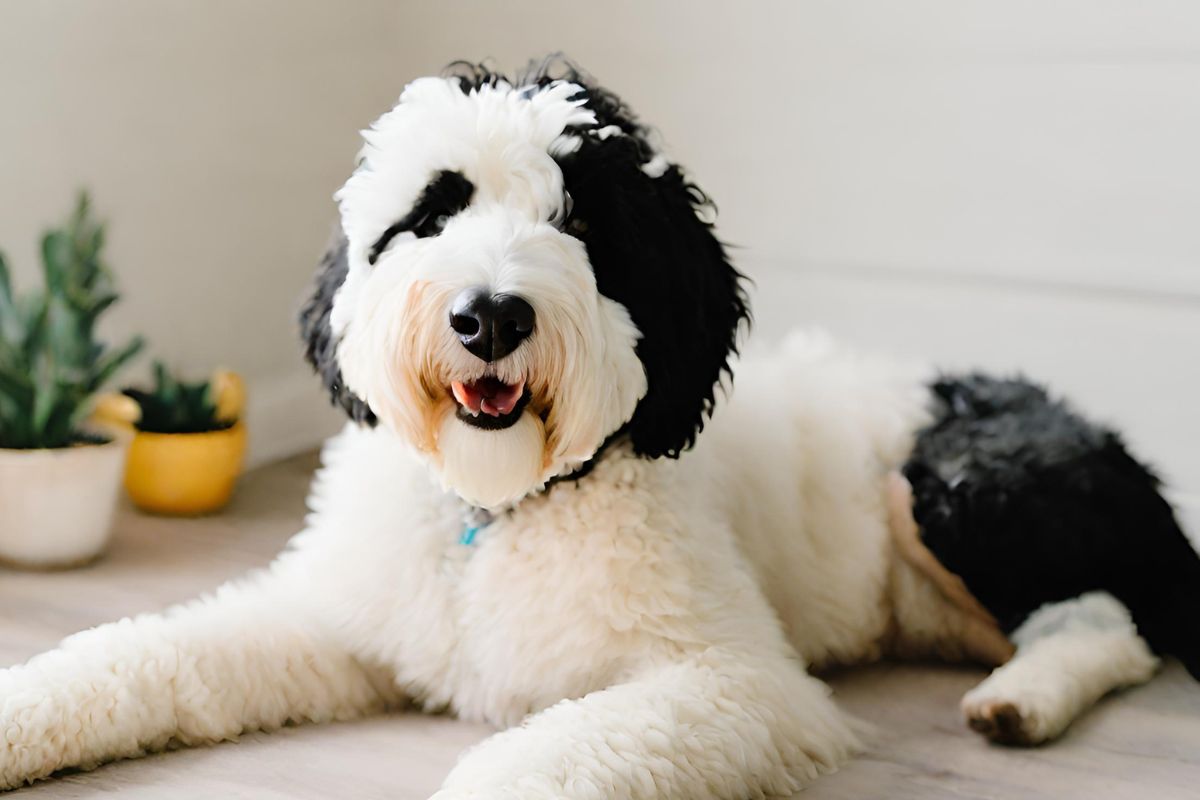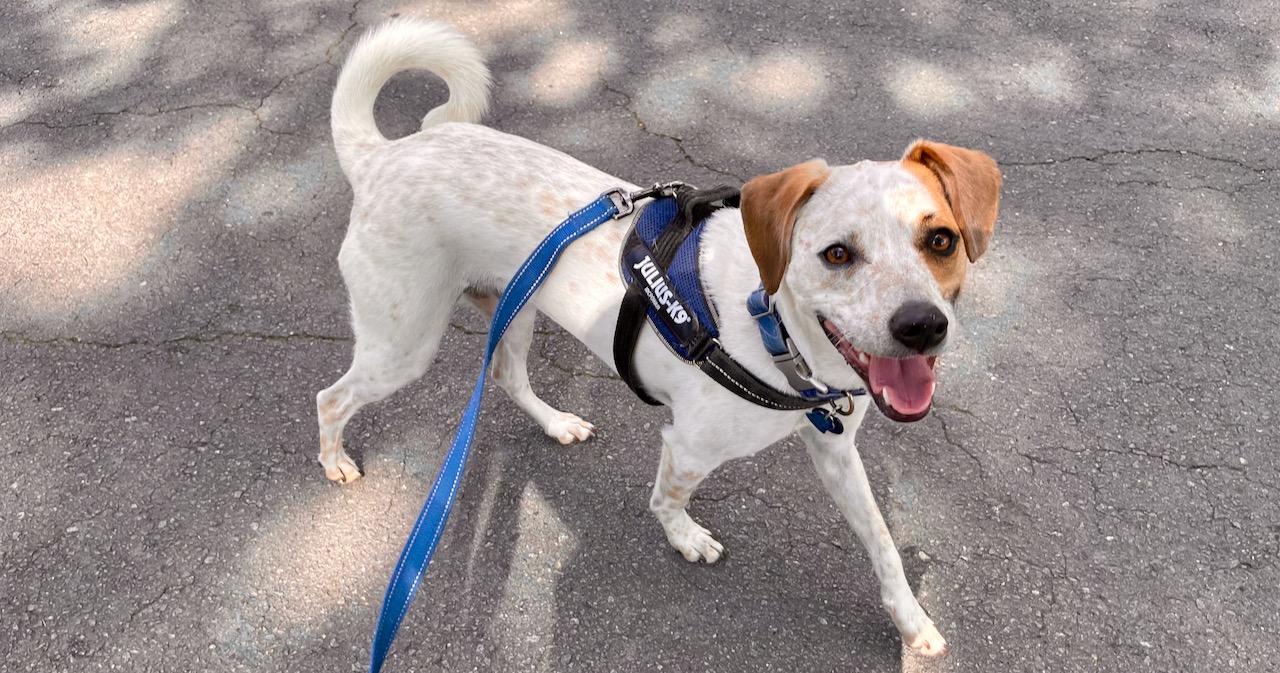Today, we’re diving into the charming world of Sheepadoodles – the delightful crossbreed that combines the intelligence of a Poodle with the gentle nature of a Sheepdog.
Old English Sheepdogs are not dogs that you see everyday. OES or bobtails, as they are also known as, are those large loveable pooches that are just full of personality. You know the ones…you have seen them on tv shows and movies.
Even though you don’t see a lot of OES in real life, you probably have seen a Sheepadoodle recently, especially if you spend any time browsing Instagram. A Sheepadoodle is a mix between an Old English Sheepdog and a Poodle. And these dogs are super adorable, which is probably why they’re so popular!
Complete Guide to the Sheepadoodle Dog Breed
Thinking about getting a Sheepadoodle? Well, consider this your complete guide to everything you need to know about these designer pups! Let’s check out some fast facts first. Then, we’ll dive into their history, temperament, health, and more.

Sheepadoodle Fast Facts
| Average Weight | Standard: 60 to 80 pounds
Miniature: 25 to 40 pounds Toy: 10 to 25 pounds |
| Average Height | Standard: 18 to 24 inches (at shoulder)
Miniature: 14 to 18 inches (at shoulder) Toy: Under 14 inches (at shoulder) |
| Hypoallergenic? | Not necessarily!
If there is a higher percentage of poodle in the mix, then the chance is better. |
| Coat | Wavy to curly coat. |
| Shedding | Shedding is dependent on the mix as well.
If there is a higher percentage of Old English Sheepdog in the mix, then the chance of shedding is higher. |
| Grooming | Grooming needs vary depending on the coat type, but Sheepadoodles generally require regular brushing to prevent matting and tangling. Professional grooming every 6 to 8 weeks is often recommended to keep their coat in good condition. |
| Barking | Above Average |
| Good with kids? | Yes |
| Good with cats? | Average |
| Good with other dogs? | Average |
| Tolerates being alone | Average
They are okay being at home alone a couple of hours at a time. |
| Tolerates apartment life | Average |
| Training | Sheepadoodles are intelligent and eager to please, making them generally responsive to training. |
| People pleaser? | Yes |
| Exercise Needs | Sheepadoodles need moderate exercise requirements. Daily walks, playtime, and mental stimulation are important to keep them physically and mentally healthy. |
| Health Concerns | Hip and elbow dysplasia, eye issues, and certain genetic conditions. |
| Life Span | 10 to 12 years |
| Average cost | $1000 to $4000 |
History and Origin of the Sheepadoodle
A Sheepadoodle is a hybrid dog breed that is a cross between a Standard Poodle and an Old English Sheepdog. As a designer or hybrid breed, Sheepadoodles are not recognized by major kennel clubs like the American Kennel Club or the Kennel Club. However, they have gained popularity as family pets due to their charming appearance and desirable traits from both parent breeds.
There are plenty of rumors that Sheepadoodles were bred in the 1960s for military purposes, but not a lot of hard proof of that. As a breed for the general population, they started being bred in the 1980s. Now they are one of the most popular of the hybrid dogs.

Sheepadoodle Physical Characteristics and Appearance
Sheepadoodles are a mix of a Poodle and an Old English Sheepdog. So let’s explore a little about both of these special breeds. It can help understand the Sheepadoodle by knowing their origin story.
Poodles come in three main sizes: Standard, Miniature, and Toy (just like the Sheepadoodle). Poodles have a curly, dense, and hypoallergenic coat that comes in a wide range of colors.
Poodles have a well-muscled and athletic build. They are known for their graceful and elegant gait. Poodles are intelligent, active, and highly trainable dogs. They are often ranked among the most intelligent dog breeds.
Poodles are known for their playful and energetic nature. They thrive on physical and mental stimulation, making them great companions for active individuals and families. They are also amazing swimmers.
Poodles are known for their friendly and social nature, making them great companions. Poodles have a relatively long lifespan, often ranging from 10 to 18 years, depending on their size and overall health care.
Old English Sheepdogs, often simply referred to as “Sheepdogs” or “OES,” are a distinctive and beloved breed known for their shaggy coat, friendly demeanor, and herding heritage.
Old English Sheepdogs are large dogs. Old English Sheepdogs are known for their gentle, affectionate, and friendly nature. They tend to get along well with people, children, and other pets.
Originally bred as herding dogs, Old English Sheepdogs have a strong work ethic and a history of helping with livestock management. While they may not be as commonly used for herding today, their working instincts can still be seen. They are intelligent dogs with a strong herding instinct, which can sometimes lead to them trying to “herd” family members or objects.
Their most distinctive feature is their long, dense, and shaggy double coat. It requires regular grooming to prevent matting and to keep the dog comfortable. Old English Sheepdogs come in various colors, including gray, blue, blue merle, or grizzle with white markings.
These dogs are known for their loyalty and devotion to their families. They enjoy being part of family activities and are happiest when included in daily life for the time that they share together. Old English Sheepdogs have a life expectancy of 10 to 12 years.
As discussed earlier, Old English Sheepdogs are not dogs that you see everyday. However, they have been a favorite for Hollywood. They have been featured in several television shows and movies.
Fun Fact: Did you know that the effect of movies featuring dog breeds can impact the popularity of those breeds? That impact can last up to 10 years and is correlated with the general success of the movies, according to research.
Check out the impact of movies on dog breed popularity here. In 1959 Disney had a movie called “The Shaggy Dog.” “The Shaggy Dog” featured an Old English Sheepdog. Registrations of sheepdogs had a 100-fold increase after that movie.
Sheepadoodles:
Sheepadoodles can inherit traits from both parent breeds, resulting in a variety of appearances. They are generally medium to large-sized dogs with a curly or wavy coat that can come in various colors, including black, white, gray, or a combination of these. Their coat can require regular grooming to prevent matting.
Sheepadoodles vary in size depending on the size of the Poodle parent used in the breeding process. They typically fall into three categories: toy, medium, and standard. Toy Sheepadoodles are usually smaller, while standard Sheepadoodles can be larger and more similar in size to the Old English Sheepdog parent.
Have you ever wondered if the different sizes of the same breed of dog make a difference? In the article, “Do bigger brains equal smarter dogs?” there is evidence that larger dogs do have a couple of characteristics that differ from smaller dogs. Larger dogs have better short-term memory and self-control than smaller breeds, according to new research.

Sheepadoodle Temperament
Sheepadoodles are known for being friendly, intelligent, and loyal dogs. They tend to get along well with children and other pets, making them suitable for families. Their Poodle ancestry often contributes to their high intelligence, making them trainable and eager to please.
Sheepadoodles might exhibit some herding instincts from their Old English Sheepdog parent, which could result in a tendency to try to herd family members. However, they are a pretty adorable herder to have.
Sheepadoodle Health Considerations
Hybrid breeds like Sheepadoodles may inherit health traits from both parent breeds. While crossing different breeds can sometimes reduce the risk of certain breed-specific health issues, It’s essential for breeders to conduct health testing on both parent breeds and follow responsible breeding practices to ensure the healthiest puppies possible.
Common Health Issues for Sheepadoodles
Sheepadoodles can be prone to certain health issues. These can include hip dysplasia, elbow dysplasia, bloat, ear infections (due to their floppy ears), and eye conditions. Responsible breeding practices that prioritize the health of both parent breeds can help mitigate some of these risks.
Old English Sheepdogs can be prone to certain health issues, including hip dysplasia, cataracts, Hypothyroidism, deafness, and certain skin conditions. Some Old English Sheepdogs might be prone to autoimmune disorders that affect the skin, joints, or other systems.
Because of their size, they may also be prone to conditions like bloat or gastric torsion. If that would happen it would be a medical emergency that requires immediate intervention. These are just things to be mindful of when choosing a new dog.
Poodles are prone to hip dysplasia, eye disease, idiopathic epilepsy, sebaceous adenitis, von Willebrand’s disease, immune-mediated disorders, Legg-Calve-Perthes disease (a hip joint disorder), luxating patella’s (slipped kneecaps) bloat, and sebaceous adenitis (an inflammatory skin disease)
Caring for a Sheepadoodle
Sheepadoodles are moderately active dogs that require regular exercise to stay healthy and happy. Daily walks, playtime, and mental stimulation are essential to prevent boredom and potential behavioral issues. If you can engage your dog then everyone will be a lot happier.
You may have heard about the famous “talking” dog Bunny who is a Sheepadoodle. Bunny uses buttons to communicate with her owner. Check out this amazing dog here.
This is a great demonstration of how intelligent these dogs are and how crucial it is to stimulate their minds. They are eager to please and like to learn new things. This is certainly one way to engage them.
Grooming a Sheepadoodle
The grooming needs of a Sheepadoodle can vary depending on the coat type they inherit. Regular brushing is important to prevent matting and tangling of the hair. Some owners choose to keep their Sheepadoodles’ coats trimmed short for easier maintenance, while others prefer the longer, shaggier look.
People love doodle dogs because they assume they are all hypoallergenic, but it depends how much poodle is in the mix. In the article, Are Old English Sheepdogs Hypoallergenic?, we covered that Old English Sheepdogs are not hypoallergenic. However, the Poodle mix adds hypoallergenic properties to the Sheepadoodle.
Training a Sheepadoodle
Sheepadoodles, a crossbreed between a Poodle and an Old English Sheepdog, can vary in terms of trainability depending on their individual traits and the training methods employed. However, there are a few factors to consider:
Poodles are known for their high intelligence, while Old English Sheepdogs tend to be clever as well. Sheepadoodles usually inherit these traits, making them generally smart dogs that can learn commands and tasks relatively quickly.
Poodles are one of the smartest dogs around and they make great service animals. Read more about it in “11 Hypoallergenic Dog Breeds That Make Fantastic Service Dogs.” Poodles are one of the best dogs for service work.
Are Sheepadoodles Easy to Train?
Sheepadoodles are considered to be intelligent and eager to please, which can make them relatively easier to train compared to some other breeds. Their high intelligence can make them quick learners and capable of understanding commands.
Sheepadoodles tend to have moderate to high energy levels. If their energy needs aren’t met, they might become restless and find it difficult to focus during training sessions. Regular exercise can help them be more attentive and engaged.
While Sheepadoodles are smart, their attention span can sometimes be short, especially when they’re young. Keeping training sessions short and engaging can help maintain their focus. Sheepadoodles generally respond well to positive reinforcement techniques, such as treats, praise, and play.
How to Train a Sheepadoodle
Sheepadoodles often have a friendly and sociable nature. This can be an advantage for training, as they might be more motivated to please their owners and interact positively with people and other dogs.
Consistency is key in training any dog, and Sheepadoodles are no exception. Using consistent commands and routines will help them understand what’s expected of them. Rewarding desired behaviors encourages them to repeat those behaviors.
Proper socialization from a young age can help Sheepadoodles develop good behavior and comfort around various people, animals, and environments.
Like many young dogs, Sheepadoodle puppies can be exuberant and full of energy. This youthful energy might lead to some initial challenges in training, but with time and consistent training, they usually mature into well-behaved adults.
If you find training challenging, consider enrolling your Sheepadoodle in obedience classes or working with a professional dog trainer who uses positive reinforcement methods. Professional guidance can be valuable in overcoming any training hurdles.
Adopting a Sheepadoodle Puppy
When looking for a Sheepadoodle, it’s important to seek out responsible breeders who prioritize the health and well-being of the dogs. Additionally, consider adopting from shelters or rescue organizations, as there might be Sheepadoodle mixes in need of loving homes.
Where to Find Sheepadoodles Puppies
When considering the adoption of a Sheepadoodle, it’s advisable to ask the breeder about the sizes of the parent dogs and engage in a conversation regarding your preferences. This will provide you with a clearer understanding of the potential size your puppy could eventually reach.
Like any dog breed, responsible breeding practices are crucial to ensure the health and well-being of Sheepadoodles. Reputable breeders prioritize the health of the parent dogs, conduct health tests, and focus on producing well-adjusted and healthy puppies. Here are some ways to find reputable breeders or rescue organizations that have Sheepadoodles.
How Much does a Sheepadoodle Cost?
The cost of a Sheepadoodle can vary widely depending on factors such as the breeder’s reputation, location, the dog’s lineage, size, color, coat type, and demand for the breed.
Additionally, prices can differ between different types of Sheepadoodles.
- Standard Sheepadoodles are usually larger in size and are typically bred from a Standard Poodle and a Old English Sheepdog. Price range $1000 to $4000.
- Mini Sheepadoodles are smaller in size and are typically bred from a Miniature Poodle and an Old English Sheepdog. Price range $1000 to $3500
- Tiny or Toy Sheepadoodle: These are the smallest variations of Sheepadoodles, often bred from a Toy Poodle and a Old English Sheepdog. Price range $1000-$3000
Conclusion
Sheepadoodles are friendly and intelligent dogs. They tend to get along well with people, children, and other pets, making them great companions for families. Sheepadoodles can adapt to various living environments, including apartments, or homes with yards.
Sheepadoodles inherit positive qualities from both parent breeds. For example, they get the Poodle’s intelligence and non-shedding coat, as well as the Old English Sheepdog’s friendly and affectionate nature. It is a win/win all around.
This is a wonderful dog that has a playful and energetic nature, making them ideal for families or individuals who enjoy outdoor activities and exercise. Could this be your next family member? Consider a Sheepadoodle for your life.



